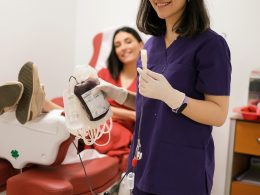Medical advancements are a constant source of hope for millions around the world. From genetics to nanotechnology, there is no shortage of exciting breakthroughs that promise to revolutionize the way we approach healthcare. In this blog post, we’ll explore some of the most promising medical advancements in development and how they could change our lives for the better. So, buckle up and get ready to be amazed by what’s on the horizon!
Cancer treatments
Cancer treatments are constantly evolving and becoming more effective. However, there is still no one-size-fits-all treatment for cancer. The most promising medical advancements in the works are personalized medicine and nanotechnology.
Personalized medicine is a approach to healthcare that takes into account an individual’s unique genetic make-up. This means that treatments can be tailored to each person, making them more effective. Nanotechnology is the study of extremely small particles. Researchers are using nanotechnology to develop new cancer treatments that target specific cells and destroy them without damaging healthy cells.
Both personalized medicine and nanotechnology are still in the early stages of development, but they hold great promise for the future of cancer treatment.
Alzheimer’s and Parkinson’s disease
There are many medical advancements that show promise for treating Alzheimer’s and Parkinson’s disease. One promising area of research is genetics. By studying the genes of people with these diseases, scientists hope to identify specific mutations that may be responsible for the development of the disease. This knowledge could then be used to develop targeted treatments that could prevent or reverse the effects of the disease.
Another area of research that shows promise for treating Alzheimer’s and Parkinson’s disease is nanotechnology. Nanotechnology involves working with particles that are just a few atoms in size. Scientists are using nanotechnology to develop new methods of delivering drugs to the brain. This could potentially allow for more targeted and effective treatment of these diseases.
The most promising medical advancements for treating Alzheimer’s and Parkinson’s disease are still in the early stages of development. However, there is reason to believe that these and other advances will eventually lead to more effective treatments for these debilitating diseases.
Diabetes
There are a number of promising medical advancements in the works that have the potential to change the way we treat and manage diabetes. Here are just a few:
1. Gene therapy: One of the most promising areas of research is gene therapy, which holds the potential to provide a cure for diabetes. In gene therapy, scientists introduce healthy copies of genes into cells in order to correct defective ones. This approach is still in its early stages, but there have been some promising results in animal studies.
2. Nanotechnology: Another area of promising research is nanotechnology, which involves the use of very small particles to deliver drugs or other treatments directly to cells. This approach has shown promise in early animal studies and is currently being tested in human clinical trials.
3. Islet cell transplantation: Another potential treatment for diabetes is transplantation of healthy islet cells from donors. This approach can restore normal insulin production and potentially reverse diabetes. However, it is still in the early stages of development and requires further study before it can be widely used.
4. Artificial pancreas: Researchers are also working on developing an artificial pancreas, which would be an implantable device that would automatically produce and deliver insulin according to the needs of the individual patient. This approach is still in development, but shows promise as a potential future treatment for diabetes.
Heart disease
Heart disease is one of the leading causes of death in the United States. In fact, it is the leading cause of death for both men and women. Every year, about 610,000 people die from heart disease in the United States alone.
There are many different types of heart diseases, but they all generally involve some type of problem with the heart muscle or valves. The most common type of heart disease is coronary artery disease, which occurs when the arteries that supply blood to the heart become narrowed or blocked. This can lead to a heart attack.
Other types of heart diseases include arrhythmias (abnormal heart rhythms), cardiomyopathies (diseases of the heart muscle), and congenital heart defects (birth defects).
While there is no cure for heart disease, there are treatments available that can help manage the condition and improve quality of life. These treatments range from lifestyle changes to medications to surgery.
The good news is that medical science is always advancing, and there are several promising new developments in the works that could one day lead to more effective treatments for heart disease. Here are just a few:
1. Gene therapy: One potential treatment for cardiovascular diseases is gene therapy, which involves using genes to repair or replace damaged DNA in cells. This approach is still in its early stages, but it has shown promise in animal studies. 2. Stem cell therapy: Another promising treatment under development is stem cell therapy. This
Arthritis
Arthritis is one of the most common chronic diseases in the United States, affecting more than 50 million adults. It is a leading cause of pain and disability, and the costs associated with arthritis are expected to continue to rise. There is currently no cure for arthritis, but there are treatments that can help manage the symptoms.
Current treatments for arthritis include pain relief, anti-inflammatory medications, and physical therapy. Some people with arthritis also use complementary and alternative therapies, such as acupuncture or massage. In recent years, there have been significant advancements in the treatment of arthritis, and more effective treatments are being developed all the time.
One promising area of research is nanotechnology. Nanotechnology is the study of extremely small particles, and it has many potential applications in medicine. Researchers are working on ways to use nanotechnology to deliver drugs directly to arthritic joints, which could potentially improve the efficacy of treatment while reducing side effects.
Another promising area of research is gene therapy. Gene therapy involves using genetic engineering to correct defects in genes that cause disease. In theory, gene therapy could be used to correct the genetic defects that cause arthritis, potentially curing the disease altogether. However, gene therapy is still in its early stages of development, and much more research needs to be done before it can be used to treat patients.
The future looks promising for those with arthritis. With continued advances in medical research, more effective treatments will be developed that can improve quality of life for those
Newborn Screening
There are many incredible medical advancements currently in development, ranging from genetics to nanotechnology. However, here we will focus on the most promising medical advancements in the works that have the potential to change healthcare as we know it.
Newborn screening is one of the most important medical advancements currently in development. This technology has the potential to save countless lives by identifying genetic disorders early on. Newborn screening can be used to detect a wide variety of conditions, such as cystic fibrosis, sickle cell disease, and Tay-Sachs disease. This allows for early intervention and treatment, which can greatly improve the outcome for these patients.
Another promising medical advancement is personalized medicine. This is a relatively new field that is rapidly evolving. Personalized medicine tailors treatments to an individual’s specific genetic makeup. This means that treatments are much more likely to be effective, and side effects are much less common. This approach has already shown great promise in cancer treatment, and it is expected to revolutionize healthcare in the years to come.
These are just a few of the most promising medical advancements currently in development. With continued research and advances in technology, there is no telling what else we may be able to accomplish in the future!
Conclusion
From genetics to nanotechnology, the medical industry is making huge strides towards more efficient ways of diagnosing and treating a variety of conditions. The research currently being conducted promises to revolutionize healthcare and has the potential to save countless lives in the years to come. As we continue our journey into uncharted territory, it’s important that we remain focused on providing safe and effective treatments that will benefit all humanity. With increased knowledge and awareness, nothing can stand in our way from realizing this goal.












